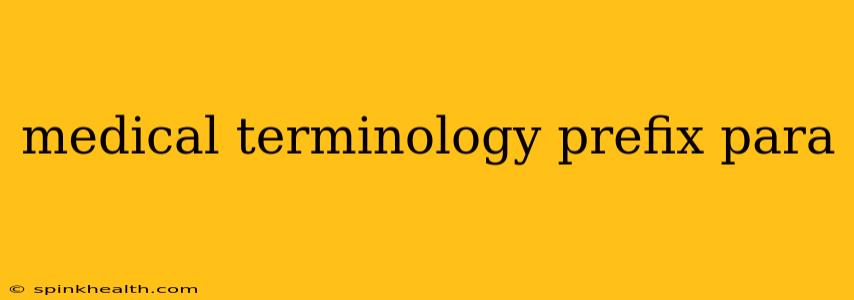Decoding the Medical Prefix "Para-": A Journey Through Medical Terminology
The world of medicine is brimming with fascinating terminology, a language all its own. Understanding this language is key, not just for medical professionals, but for anyone seeking to better understand their health and the information provided by healthcare providers. Today, we delve into a specific component of this medical lexicon: the prefix "para-." It’s a seemingly simple addition, yet it carries significant weight in shaping the meaning of many medical terms.
Imagine yourself in a doctor's office, or perhaps you’re reading a medical report. You encounter a term containing "para-." What does it mean? Let's unravel the mystery together, exploring not just its literal definition but also the nuances and specific contexts in which this prefix is utilized.
This isn't just about rote memorization; we'll explore "para-" through real-world examples, illustrating its usage and its impact on understanding various medical conditions and procedures. This will give you a much deeper appreciation of this common, yet important, medical prefix.
What Does the Prefix "Para-" Mean in Medical Terminology?
The prefix "para-" most commonly means beside, near, beyond, or around. It indicates a location, position, or relationship to something else. This seemingly simple definition gives rise to a wide array of medical terms, each with its own specific meaning and application. Let's delve deeper into this by looking at some frequently asked questions.
What are some examples of medical terms that use the prefix "para-"?
This is a fantastic question, and the answer is surprisingly extensive. Let's examine a few key examples:
-
Paracentesis: This procedure involves inserting a needle into the peritoneal cavity (the space between the abdominal wall and organs) to remove fluid. Here, "para-" suggests a process occurring near or around the abdominal cavity.
-
Paraplegia: This refers to paralysis affecting the lower half of the body. The "para-" here indicates a condition affecting the body's sides, specifically the lower limbs.
-
Parathyroid glands: These tiny glands are located behind the thyroid gland, hence the "para-" prefix.
-
Paranasal sinuses: These air-filled spaces are located near the nasal cavity.
-
Paraphimosis: This condition involves the inability to retract the foreskin over the glans penis, implying a condition occurring around the penis.
How is the prefix "para-" different from other prefixes with similar meanings?
This is a crucial point to consider. While "para-" indicates proximity, it's important to distinguish it from similar prefixes like "peri-" (around) and "circum-" (around, around). While there might be overlap, subtle differences exist in their usage. "Peri-" often implies a surrounding or encircling relationship, while "circum-" emphasizes a complete encirclement. "Para-", as we've seen, denotes a position alongside or near something. Understanding these nuanced distinctions is key to interpreting medical terminology accurately.
Are there any less common meanings for the prefix "para-" in medical terminology?
Yes, while "beside, near, beyond, or around" is the most common usage, "para-" can sometimes indicate an abnormal or accessory condition. For instance, you might see it in terms describing an abnormal structure alongside a normal one. The context is crucial for deciphering the precise meaning in these cases.
How can I improve my understanding of medical prefixes and suffixes?
Learning medical terminology can seem daunting, but it's a rewarding journey. Start by focusing on common prefixes and suffixes. Use flashcards, medical dictionaries, and online resources. The key is consistent practice and engagement with the material. Immerse yourself in medical texts and try to identify and decipher the meaning of prefixes and suffixes in context.
Understanding the prefix "para-" is a significant step in navigating the world of medical terminology. Its consistent usage across diverse medical contexts demonstrates its importance and impact in both the understanding and description of a wide array of medical conditions and procedures. By learning prefixes like "para-", you enhance not only your medical vocabulary but also your ability to comprehend and interpret crucial healthcare information, empowering you to engage more effectively with healthcare professionals and your own health journey.

